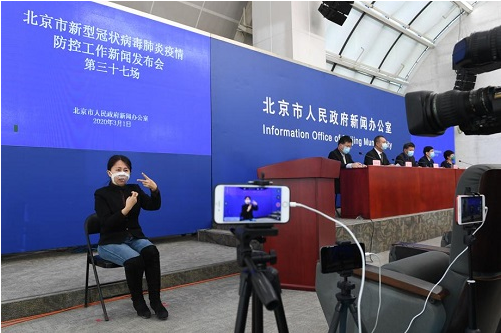
Leng Xinxue, a member of the staff at the Beijing Disabled Persons' Federation, offers a sign language interpretation at a news conference about COVID-19 on March 1. Leng wears a transparent mask to make it easier to read her lips. [Photo/Xinhua]
BEIJING-The Beijing Disabled Persons' Federation is offering more support through the citizen hotline to the physically disadvantaged residents who encountered unexpected problems amid the COVID-19 pandemic.
Poor access to information was one of the problems highlighted by blind people, as most of the materials on prevention and control were produced in written form.
The federation provided a 24-hour inquiry and help service via various channels, including the hotline's official account on WeChat and Sina Weibo, as well as on mobile apps.
"When requests come in, we are quick to respond," says Han Shuqin, director of the city's center for the protection of rights of the disabled.
Cao Jun, deputy chair of the Beijing Association of the Blind, developed an online mini-program that includes an audio manual for prevention information.
To help people physically or visually challenged to keep abreast of the news and relevant policies, the federation also called up a group of special education teachers to work as sign language interpreters at press conferences.
"Sign language broadcasting works better with lip reading, but it is impossible when a broadcaster is behind a mask," says Leng Xinxue with the federation, who came up with the idea of using transparent plastic masks.
The epidemic also caused the disabled some inconvenience in rehab training and the purchase of assistive devices, since rehab centers across the city adapted their operations to ensure social distancing.
"We suspended face-to-face activities with the disabled, but not our service for them," says Wang Jingkui of the federation.
According to Wang, restricted and non-contact events have been held in 522 rehab facilities across the city, with purchasing agent services provided for those facing special difficulties to get their daily necessities and medicines.
More than 860 rehab teachers in Beijing have given remote training courses to more than 2,600 disabled children, Wang adds.
Ren Zhi and Li Na, a blind couple who own a massage business in Chaoyang district, were happy about reopening after being closed for more than a month.
"I didn't expect that our regulars had worries about visiting due to the pandemic," Ren says."We made a loss when the parlor was closed, and, being blind, it is hard for us to disinfect and take body temperatures for our customers."
One morning, Ren dialed the hotline and by that afternoon community workers had been dispatched to help, taking registrations and checking the body temperature of customers.
"It is very kind of the community to have someone come over several times a day when they are already short of manpower because of the heavy workload with prevention and control," Li says.
To help those with physical or visual challenges to find employment, disabled persons' federations at both municipal and district levels in Beijing have organized 56 online recruitment fairs, working with municipally-administered enterprises to help 658 people find jobs, as well as enabling 500 others to be able to work at home, according to Gu Jinrong, head of the city's social security and employment service center for the disabled.
Ma Yanqing, physically disabled, is one of the beneficiaries who found a job as a phone clerk at a local tech firm and is now working at her home in Tongzhou district in the eastern suburban area of Beijing.
"I've found a sense of social identity, and I'm now more confident to integrate into and repay society," she says.

